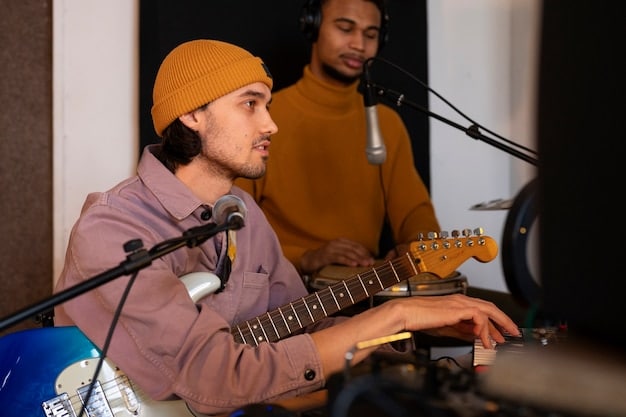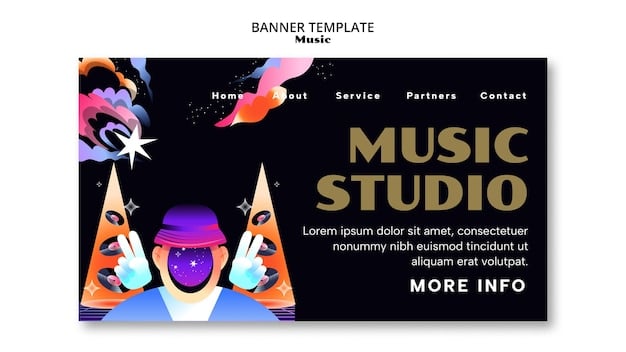Protect Your Music: 5 Legal Steps for Emerging Artists

Emerging Artists: 5 Essential Legal Steps to Protect Your Music in the Digital Age, including copyright registration, understanding licensing agreements, protecting your brand with trademarks, using proper contracts for collaborations, and navigating digital rights management to safeguard your creative work.
Navigating the music industry can be tricky, especially for emerging artists. While your creativity fuels your music, understanding the legal aspects is crucial to protect your work and career. Are you ready to ensure your music is legally sound in the digital age?
Emerging Artists: Understanding Copyright Protection
Understanding copyright is the cornerstone of protecting your musical work. Copyright law grants creators exclusive rights over their original works, preventing unauthorized use. As an emerging artist, knowing how to leverage copyright is essential to controlling your music’s destiny.
What Copyright Protects
Copyright protects various aspects of your music, including the composition (lyrics and melody) and the sound recording. It gives you the right to reproduce, distribute, perform, and display your work publicly. Without copyright, anyone could use your music without your permission or compensation.
Copyright Registration: Your First Line of Defense
While copyright exists automatically upon creation, registering your work with the U.S. Copyright Office provides significant legal advantages. Registration creates a public record of your ownership and allows you to sue for infringement and claim statutory damages and attorney’s fees.
- Register your songs promptly: The sooner you register, the better your legal position.
- Submit accurate information: Ensure all details about authorship and ownership are correct.
- Keep records of your registration: This documentation is crucial in case of disputes.

Understanding copyright is just one piece of the puzzle. Registering your work offers more robust legal protection, laying the groundwork for a successful and secure music career. Protecting your compositions and recordings starts with appreciating these essential rights.
Licensing Agreements: Monetizing Your Music Legally
Licensing agreements are vital tools for emerging artists to monetize their music while maintaining control over its usage. Understanding how to negotiate and manage these agreements can significantly impact your revenue and exposure.
Types of Music Licenses
Several types of licenses allow you to authorize different uses of your music. These include mechanical licenses (for reproduction), performance licenses (for public performances), synchronization licenses (for use in film and TV), and master use licenses (for using the original recording).
Negotiating Licensing Deals
Negotiating favorable licensing deals ensures you are fairly compensated for the use of your music. Consider the scope of the license, the duration, the territory, and the royalty rates. Consulting with an experienced attorney can help you navigate complex licensing agreements.
- Understand the market rate: Research typical royalty rates for different uses.
- Retain rights where possible: Avoid giving away exclusive rights unless necessary.
- Clarify payment terms: Ensure clear and timely payment schedules.
Licensing agreements are not just about money; they are about controlling how your music is used and ensuring you receive credit where it’s due. Take the time to learn about these agreements and seek professional advice when needed. Mastering licensing will protect both your creative work and your financial interests.
Trademarking Your Brand: Protect Your Artist Name and Logo
Your artist name and logo are core elements of your brand. Trademarking these assets prevents others from using them in a way that could cause confusion or dilute your brand identity. Protecting your brand is a proactive step toward building a lasting career.
Why Trademarking Matters
A trademark provides exclusive rights to use your brand name and logo concerning specific goods or services (e.g., music recordings and performances). This protects you from imitators and allows you to build a strong brand reputation. Without a trademark, you risk losing control over your identity.
The Trademark Registration Process
Registering a trademark involves conducting a search to ensure your desired mark is available, filing an application with the U.S. Patent and Trademark Office (USPTO), and responding to any objections or requests from the USPTO. The process can be complex, so consider seeking legal assistance.

- Conduct a thorough search: Check existing trademarks to avoid conflicts.
- Use your mark consistently: Maintain a consistent brand presentation.
- Monitor for infringement: Regularly check for unauthorized use of your mark.
Trademarking protects your brand by establishing clear legal ownership of your name and logo. By taking this step, you make sure that your brand identity remains unique and untarnished.
Contracts and Collaborations: Formalizing Relationships
Collaborations are common in the music industry, but without proper contracts, they can lead to disputes and misunderstandings. Formalizing your relationships with collaborators, producers, and other parties is essential for protecting your interests.
Types of Contracts
Various contracts govern relationships in the music industry, including collaboration agreements (outlining ownership and credit for co-created works), producer agreements (defining the producer’s role and compensation), and performance agreements (specifying the terms of live performances).
Essential Contract Clauses
Contracts should include essential clauses such as the scope of work, ownership of intellectual property, payment terms, termination rights, and dispute resolution mechanisms. Ensure that all parties have a clear understanding of their rights and obligations.
- Define roles and responsibilities clearly: Avoid ambiguity in descriptions.
- Specify ownership percentages: Clarify who owns what from the outset.
- Include termination clauses: Outline conditions under which the contract can be ended.
Agreements provide a solid framework for collaborations and other professional relationships. Clear and concise contracts are the best to safeguard your music and professional collaborations.
Digital Rights Management (DRM): Protecting Your Music Online
In the digital age, protecting your music from piracy and unauthorized distribution is crucial. Digital Rights Management (DRM) technologies and strategies can help you control how your music is used online.
DRM Technologies
DRM technologies include encryption, watermarking, and access controls that limit unauthorized copying and distribution. While DRM can be effective, it can also be controversial due to its potential impact on legitimate users.
Alternative Strategies
Beyond DRM, alternative strategies for protecting your music online include monitoring for infringement, sending takedown notices to websites hosting unauthorized content, and using licensing services that track and monetize usage. Being proactive in protecting your music online can preserve your revenue and reputation.
- Use watermarks: Embed identifying information in your music files.
- Monitor online platforms: Regularly check for unauthorized use.
- Issue takedown notices: Promptly address any infringement you find.
With proactive strategies to protect your music online you are able to preserve both your income and your reputation as an artist. By implementing a combination of DRM and vigilance you can mitigate the risks of digital piracy, supporting a solid and sustainable future in the music industry.
The Importance of Legal Counsel for Musicians
Navigating the legal landscape of the music industry can be complex. Consulting with an experienced entertainment attorney can provide invaluable assistance in protecting your rights, negotiating contracts, and resolving disputes.
When to Seek Legal Advice
It’s advisable to seek legal advice when you’re entering into significant agreements (e.g., recording contracts, publishing deals), facing potential infringement issues, or dealing with other legal challenges. An attorney can review documents, advise you on your rights, and represent you in negotiations or litigation.
Finding the Right Attorney
Look for an attorney who specializes in entertainment law and has experience working with musicians. Seek recommendations from industry colleagues, check online reviews, and schedule consultations to find someone who understands your needs and goals.
- Check their credentials: Ensure they are licensed and in good standing.
- Ask about their experience: Inquire about their work with similar artists.
- Discuss their fees: Understand their billing practices upfront.
Hiring a seasoned music attorney is an investment in your career, offering you the expertise you need to safeguard your musical assets and navigate the complexities of the music business with assurance. Don’t hesitate to seek professional counsel when it matters most.
| Key Point | Brief Description |
|---|---|
| ©️ Copyright Registration | Protects your music from unauthorized use; register with the U.S. Copyright Office. |
| 🤝 Licensing Agreements | Monetize your music legally through mechanical, performance, and synchronization licenses. |
| ™️ Trademarking | Protects your artist name and logo, preventing brand confusion. |
| 🔒 Digital Rights Management | Use DRM and monitoring strategies to protect your music from online piracy. |
FAQ Section
▼
Copyright registration creates a public record of your ownership, allowing you to sue for infringement and claim statutory damages and attorney’s fees. It helps safeguard your exclusive rights.
▼
Be aware of mechanical licenses (reproduction), performance licenses (public performances), synchronization licenses (film/TV), and master use licenses (original recordings). Each serves a different purpose.
▼
Trademarking grants you exclusive rights to use your brand name and logo, preventing others from using them in ways that could confuse your audience or dilute your brand’s identity. It reinforces your uniqueness.
▼
Your contracts should include the scope of work, ownership of intellectual property, payment terms, termination rights, and dispute resolution mechanisms to thoroughly protect all parties involved.
▼
DRM includes encryption and access controls to limit unauthorized copying and distribution. Combine DRM with monitoring and takedown notices for comprehensive online protection against piracy and ensure your music is safe.
Conclusion
In conclusion, understanding and implementing these five essential legal steps is crucial for emerging artists to protect their music in the digital age. From copyright registration and licensing agreements to trademarking, contracts, and digital rights management, each step plays a vital role in safeguarding your creative work and building a sustainable career. By taking proactive measures, you can navigate the complexities of the music industry with confidence and focus on what you do best: creating music.





